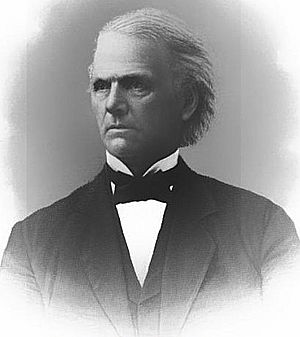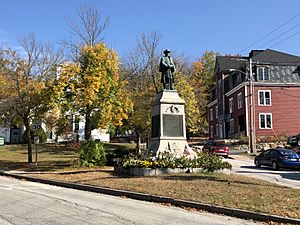Walter Harriman (politician) facts for kids
Quick facts for kids
Walter Harriman
|
|
|---|---|
 |
|
| Born | April 8, 1817 Warner, New Hampshire |
| Died | July 25, 1884 (aged 67) Concord, New Hampshire |
| Place of burial |
Pine Grove Cemetery, Warner,
New Hampshire |
| Allegiance | United States of America Union |
| Service/ |
United States Army Union Army |
| Years of service | 1862–1863 1864–1865 |
| Rank | |
| Commands held | 11th New Hampshire Infantry |
| Battles/wars | American Civil War |
| Other work | Governor of New Hampshire |
Walter Harriman (April 8, 1817 – July 25, 1884) was an American minister, merchant, soldier, and politician. He served two terms as the governor of New Hampshire. During the American Civil War, he was a colonel in the Union Army. Later, in 1866, he was recognized as a brevet brigadier general of volunteers.
Early Life and Career
Walter Harriman was born and grew up in Warner, New Hampshire. From 1835 to 1840, he worked as a teacher in schools across New Hampshire, Massachusetts, and New Jersey. While teaching, he also studied theology. In 1840, he joined the Universalist Church and later became a preacher. He preached in Harvard, Massachusetts, and his hometown of Warner.
In 1849, Harriman started his political career as a member of the Democratic Party. He was elected to the New Hampshire Senate and served until 1850. The next year, he stopped being a minister and opened a store in Warner. He partnered with John S. Pillsbury, who later became the governor of Minnesota.
Harriman returned to politics in 1853, serving as the state treasurer until 1854. He then moved to Washington, D.C., to work as a clerk in the Pension Office, a job he held until 1856. After returning to New Hampshire, he was elected to the state legislature in 1858. He then served in the state senate again from 1859 to 1861. After his term, he became a newspaper editor in Manchester, New Hampshire.
Service in the Civil War
In 1862, Walter Harriman was appointed as a colonel of the 11th New Hampshire. This was a new regiment of infantry soldiers who signed up for three years. He led his regiment from Cincinnati, Ohio, across the rugged Cumberland Plateau in Kentucky and Tennessee. Their goal was to join Major General Ambrose Burnside's army in Knoxville, Tennessee. Colonel Harriman did not ride a horse; he walked the entire 20-day journey with his men. During this trip, they camped near the Emory River in Tennessee. A city was later founded near this spot and named Harriman, in his honor.
Harriman briefly left his military service in June 1863 to run for governor of New Hampshire. He ran as a "War Democrat," which meant he supported the war effort. His candidacy split the Democratic votes, helping the Republican candidate, Joseph A. Gilmore, win the election.
Harriman rejoined the 11th New Hampshire Infantry as colonel in January 1864. In May 1864, he was captured by Confederate soldiers at the Battle of the Wilderness. This battle was part of the Overland Campaign. He was released in September 1864 in a prisoner exchange. From April 2 to April 22, 1865, he commanded a brigade in the IX Corps (Union Army) of the Army of the Potomac. He left volunteer service on June 4, 1865. In July 1866, he was officially recognized as a brevet brigadier general of volunteers.
After the War

After the Civil War ended in 1865, Harriman joined the Republican Party. He served as the New Hampshire Secretary of State until 1867. That year, he was elected as the state's governor. Harriman served two terms as Governor of New Hampshire, from 1867 to 1869.
As governor, Harriman encouraged people and lawmakers to develop New Hampshire's farms, factories, and forests. This was important for building the state's economy after the war. He cared a lot about educating the state's citizens. He signed a law to create teacher training programs. He also wrote a law to improve education and created a special fund for schools using money from state land sales.
After retiring from politics, Harriman worked as a Naval Officer for the Port of Boston until 1877. In 1879, he published his book, History of Warner. He then traveled to Europe and the Far East from 1882 to 1883. He wrote about his travels in a book called Travels and Observations in the Far East, published in 1883.
Walter Harriman passed away on July 25, 1884, in Concord, New Hampshire. He was buried in Pine Grove Cemetery in Warner, New Hampshire. In the early 1890s, his son, Walter C. Harriman, helped found the city of Harriman, Tennessee, which was named after Governor Harriman.
 | Emma Amos |
 | Edward Mitchell Bannister |
 | Larry D. Alexander |
 | Ernie Barnes |

